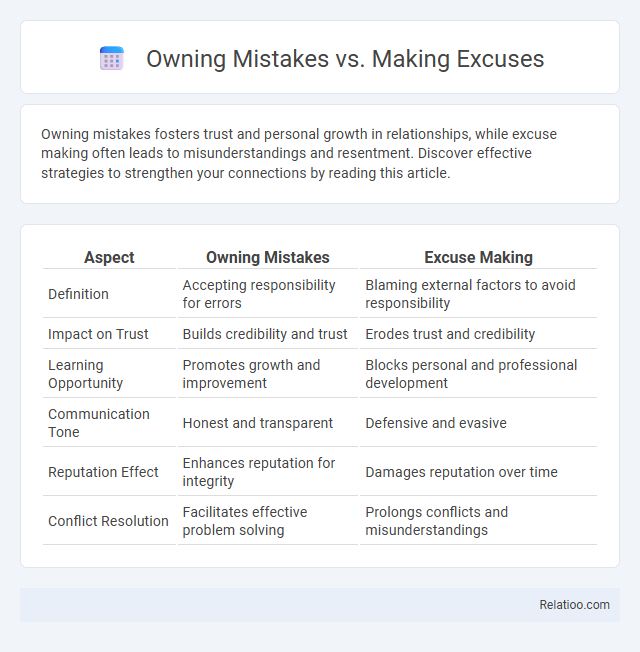Owning mistakes fosters trust and personal growth in relationships, while excuse making often leads to misunderstandings and resentment. Discover effective strategies to strengthen your connections by reading this article.
Table of Comparison
| Aspect | Owning Mistakes | Excuse Making |
|---|---|---|
| Definition | Accepting responsibility for errors | Blaming external factors to avoid responsibility |
| Impact on Trust | Builds credibility and trust | Erodes trust and credibility |
| Learning Opportunity | Promotes growth and improvement | Blocks personal and professional development |
| Communication Tone | Honest and transparent | Defensive and evasive |
| Reputation Effect | Enhances reputation for integrity | Damages reputation over time |
| Conflict Resolution | Facilitates effective problem solving | Prolongs conflicts and misunderstandings |
The Power of Admitting Mistakes
Admitting mistakes demonstrates accountability and fosters trust, essential components for personal and professional growth. Embracing errors allows for constructive learning, preventing repeated failures and enhancing problem-solving skills. Deflecting blame or making excuses undermines credibility and stalls progress, while owning mistakes empowers individuals and teams to improve and innovate.
Why People Resort to Excuses
People resort to excuses as a defense mechanism to protect their self-esteem and avoid facing uncomfortable truths about their mistakes. Excuses serve as a psychological shield, allowing individuals to deflect responsibility and reduce feelings of guilt or failure. Understanding your tendency to make excuses can help foster accountability and promote personal growth by encouraging ownership of actions instead.
Psychological Impacts of Owning Up
Owning your mistakes fosters psychological resilience by promoting accountability and reducing feelings of guilt and shame. This practice encourages personal growth and strengthens self-esteem, contrasting sharply with excuse making and deflection, which often perpetuate denial and internal conflict. Embracing responsibility enables clearer self-awareness and healthier emotional regulation, improving overall mental well-being.
Excuse Making: Short-Term Gain, Long-Term Pain
Excuse making provides short-term relief by avoiding accountability, but it ultimately erodes trust and hinders personal growth. Your tendency to dodge responsibility creates a pattern that damages relationships and workplace morale over time. Embracing ownership, rather than excuse making, fosters resilience and long-lasting success.
How Accountability Builds Trust
Owning mistakes demonstrates accountability, which directly fosters trust by showing reliability and integrity. Excuse making undermines credibility and stalls personal growth, weakening relationships both personally and professionally. Deflection shifts blame and erodes trust, whereas accountability signals responsibility and strengthens confidence in leadership and teamwork.
The Consequences of Avoiding Responsibility
Avoiding responsibility through excuse making or deflection leads to a breakdown in trust and stunted personal growth, as accountability fosters learning and improvement. When you own your mistakes, you demonstrate integrity and create opportunities for constructive change, whereas evading accountability can result in damaged relationships and missed development. The consequences of avoiding responsibility often include increased conflict, decreased credibility, and a pattern of repeated errors that hinder success.
Growth Mindset: Learning from Errors
Owning mistakes fosters a growth mindset by encouraging reflection and adaptation, which leads to continuous personal and professional development. Excuse making and deflection hinder your ability to learn from errors, stalling progress and reducing accountability. Embracing responsibility for missteps empowers you to transform challenges into valuable growth opportunities.
Strategies to Move from Excuses to Ownership
Effective strategies to move from excuse making to ownership start with fostering self-awareness and accountability by honestly assessing your actions and their outcomes. You can cultivate a growth mindset by reframing mistakes as learning opportunities rather than failures, which promotes responsibility over deflection. Developing consistent reflection habits and seeking constructive feedback empower you to take ownership and implement changes that drive personal and professional growth.
Culture of Accountability in Teams
A culture of accountability in teams thrives when members prioritize owning mistakes rather than excuse making or deflection, fostering trust and continuous improvement. Your commitment to acknowledging errors creates opportunities for learning and reinforces transparent communication, which drives higher team performance. Emphasizing responsibility over blame shifts team dynamics toward collaboration and resilience.
Transforming Mistakes into Opportunities
Owning mistakes empowers you to learn, grow, and turn setbacks into valuable opportunities by fostering accountability and self-awareness. Excuse making blocks progress, while deflection shifts blame, both hindering personal development and preventing meaningful change. Transforming mistakes into opportunities requires embracing responsibility, analyzing errors, and applying lessons to enhance future decisions and actions.

Infographic: Owning Mistakes vs Excuse Making
 relatioo.com
relatioo.com